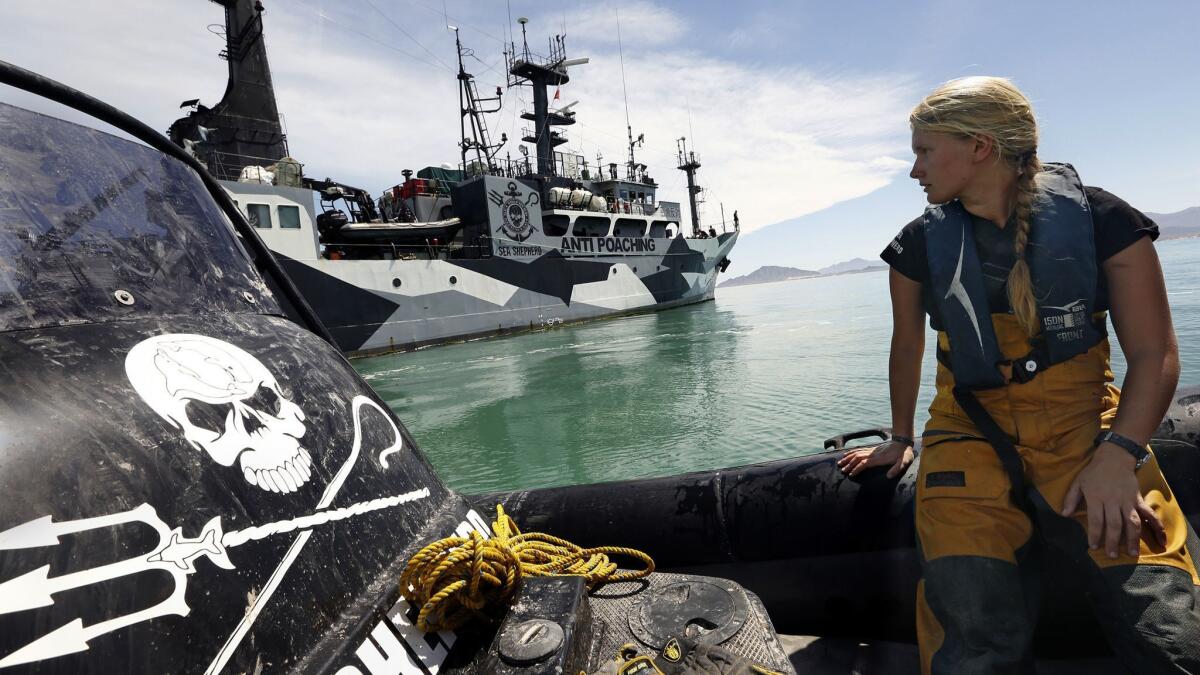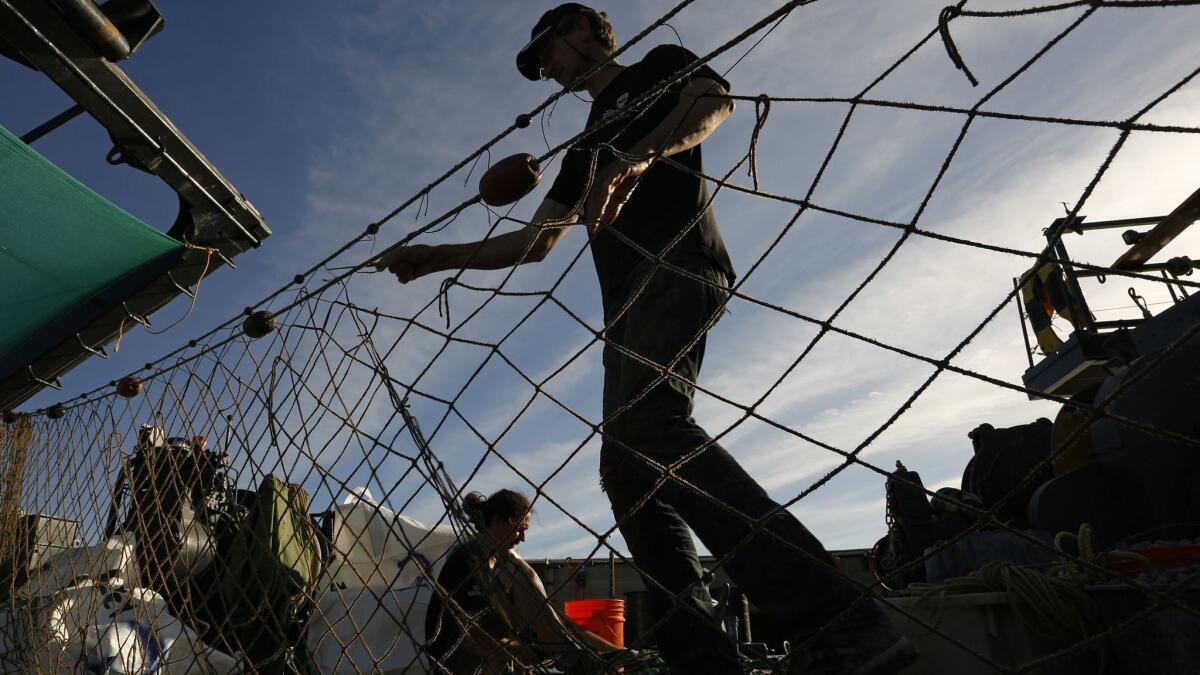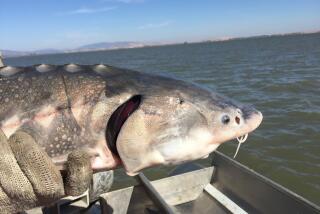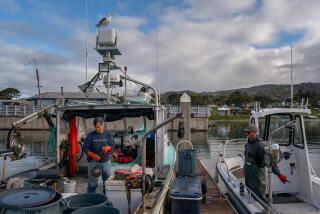To save the world’s rarest marine mammal, conservationists seek ban on Mexican seafood imports

- Share via
A decade of rescue crusades by conservation groups, hard-core eco-activists and the U.S. Navy have failed to prevent the world’s rarest porpoise from becoming fatally entangled in gill nets set for seafood in Mexico’s northern Gulf of California.
Now, with fewer than 20 left in the wild, the prospect of the vaquita’s extinction within two years has prompted a last-ditch effort with significant economic and political consequences for the United States and Mexico.
Conservationists on Tuesday asked an international trade court judge in New York for a preliminary injunction banning imports of an estimated $16 million worth of fish and shrimp harvested with gill nets in an area of the gulf roughly a third of the size of Los Angeles County and just three hours south of the border.
U.S. Court of International Trade Judge Gary Katzmann said he would rule within two weeks. His decision may hinge, in part, on whether the costs of implementing an embargo to save the species are greater than the costs of its disappearance.

The Sea Shepherd Conservation Society is fighting the eradication of the world’s most endangered sea mammal, the vaquita. (Video by Carolyn Cole / Los Angeles Times)
An embargo on about 47 tons of corvina, 90 tons of sierra, 172 tons of chano and 1,150 tons of shrimp caught annually within 160 miles of the border “would create the necessary incentives to ensure that the Mexican government takes the gill-net problem seriously,” Giulia Good Stefani, an attorney representing the Natural Resources Defense Council in the case, said in an interview, “just as embargoes catalyzed the transition to dolphin-safe tuna and turtle-safe shrimp trawling.”
Tighter control of the fishing industry may also help reduce the number of vaquita killed in gill nets that poachers use to snare a large endangered fish known as the totoaba, whose swim bladder is prized on the black market in China, where it is believed to have medicinal properties.
A gill net is a wall of netting hung vertically in the water that lets a fish get its head, but not its body, through the mesh. The fish’s gills get caught in the mesh as it tries to back out.
Katzmann took the request under consideration after hearing arguments presented by Good Stefani and Agatha Koprowski, a Department of Justice attorney representing defendants such as Commerce Secretary Wilbur Ross, Treasury Secretary Steven T. Mnuchin, Secretary of Homeland Security Kirstjen Nielsen, and Chris Oliver, assistant administrator of the National Marine Fisheries Service.
Koprowski argued that a judicially imposed import ban could threaten high-level ongoing negotiations between the United States and Mexico regarding the fate of the vaquita and undermine Mexico’s trust in the United States as a negotiating partner.
“As a result, Mexico might refuse to implement measures it would have otherwise considered,” Koprowski said in court documents.
The lawsuit by the Natural Resources Defense Council, the Center for Biological Diversity and the Animal Welfare Institute contends that by allowing gill-net-caught fish and shrimp from the vaquita’s range to be imported into the United States, the defendants are violating the Marine Mammal Protection Act, which requires the government to ban seafood from foreign fisheries that kill or injure marine mammals at a rate above U.S. standards.
The unprecedented decline of the vaquita — whose numbers drop about 50% each year — does not meet those standards. Scientists say the vaquita population has dwindled from 567 in a 1997 survey to fewer than 20.
In documents filed with the court in a related lawsuit, Mexico’s National Chamber of Fisheries and Aquaculture Industries argued that the protection act lacks the authority to impose an emergency ban on foreign fish products. A dismissal, it added, would provide Mexico’s regulatory authorities with more time to improve vaquita protection measures.

The vaquita, whose name translates as “little cow,” is the world’s smallest porpoise, with the smallest geographical range of any marine mammal. Its chubby frame and black-ringed eyes have earned it the nickname “panda of the sea.” No marine mammal faces such an immediate threat of extinction.
Recent necropsies on dead vaquitas showed “there are still breeding females out there and the animals are eating,” Sarah Uhlemann, international program director at the Center for Biological Diversity, said in an interview. “So, the species still has a chance.”
Meanwhile, tensions are escalating among conservationists, Mexican fishermen, whose livelihoods are threatened by tighter fishing controls, and poachers in the illegal totoaba trade, which authorities say is more lucrative than cocaine trafficking.
The U.S. conservation group Sea Shepherd has sent boats to the gulf to monitor gill-netting activities. A year ago, a fisherman shot down a drone that belonged to Sea Shepherd, authorities said. In a separate incident last year, fishermen in the port town of San Felipe painted “Sea Shepherd” on the side of an old boat and burned it.
In early 2017, the U.S. Navy deployed trained bottlenose dolphins to help capture some of the remaining vaquitas so they could be taken to a protected pen. That effort was scrapped in November when an adult female vaquita died after a few hours in captivity.
Conservationists fear the consequences of another gill-net fishing season.
“The weight on our side of the legal scale in this matter is extinction,” Uhlemann said. “It doesn’t get more serious than that.”
Twitter: @LouisSahagun
More to Read
Sign up for Essential California
The most important California stories and recommendations in your inbox every morning.
You may occasionally receive promotional content from the Los Angeles Times.











